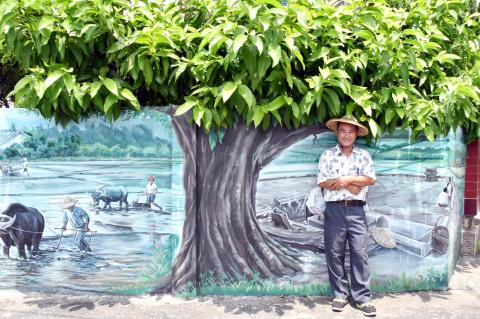Erlun Village in Pingtung County used to be the local township administration center during the Japanese colonial era, but that role was later replaced by Jhutian Village, ending Erlun’s days of glory. Erlun villagers became more and more closed-minded. For years, weeds grew along the walls and corners of the village. People stopped caring about one another and allowed even the most inconsequential things to cause disputes.
Village Warden Li I-jen says that “Erlun,” when pronounced in Hakka, sounds like “argument.” It is quite common for Erlun villagers to have arguments or quarrels with one another over things like the neighbor’s dog barking too loudly, somebody’s car not being parked properly or someone’s weeds not being tidied up regularly. These disputes could even end up in a mediation committee. In his nearly 10 years as village warden, Li’s highest record is settling four disputes in one day.
Since the community development association obtained funds and invited artists to work in the village, 10 walls of various sizes have been redesigned, and the originally bleak corners have also been brightened up with lively colorful paintings.

Photo: Chiu Chih-jou, Liberty Times
照片:自由時報記者邱芷柔
The murals in Erlun Village mostly depict bustling scenes from the village’s past and life in the countryside. Li said that not only has the village recently seen more tourists visiting, but the villagers also have started helping each other. Mediation cases have been greatly reduced, as if the murals had brought out shared memories that join people together, he says.
(Liberty Times, translated by Ethan Zhan)

Photo: Chiu Chih-jou, Liberty Times
照片:自由時報記者邱芷柔
屏東縣二崙村在日治時代前是當地的行政中心,後來行政中心轉往現在的竹田村,二崙村繁榮景象不再,村民越來越封閉,多年來社區牆面、角落都雜草叢生,大家自掃門前雪,連芝麻小事都要計較。
二崙村村長李毅仁說,「二崙」的客家話與「議論」發音相同,而住在二崙村的村民常有議論、紛爭情形,隔壁的狗太吵、車子沒停好、雜草沒整理都能鬧上調解會,他當村長近十年期間,最高紀錄一天就要處理四件調解案。
經過社區發展協會爭取經費,邀請藝術家下鄉後,目前社區有十面大小不一的牆面被換上新裝,原本黯淡的角落也因為生動活潑的彩繪變得明亮。
二崙村內的壁畫,多以描繪二崙村過去繁榮景象與農村生活為主。李毅仁說,最近不僅觀光客變多了,村民也開始互相幫忙,調解案件量大大減少,就像是壁畫牽起大家共同記憶一樣。
(自由時報記者邱芷柔)

A: Harvard professor Robert Waldinger’s “7-day Happiness Challenge” includes: Day 1: Take stock of your relationships; Day 2: The secret power of an 8-minute phone call; Day 3: Small talk with strangers has big benefits. B: That’s not too hard. What’s next? A: Day 4: Why you should write a “living eulogy;” Day 5: The importance of making work friends; Day 6: Don’t cancel those social plans. B: Good ideas. What’s the final challenge? A: Day 7: Keep happiness going all year long. So, I’m inviting some friends to the Taipei Lantern Festival today to build good relationships. Wanna

★ 本文由生成式 AI 協作,本刊編輯編修。 For tourists looking for a scenic way to spend an afternoon in Kaohsiung, heading to the British Consular Residence of Takao is the perfect choice. Its elevated position allows one to take in the bustling Kaohsiung Harbor to the east and the dazzling sunset over Sizihwan Bay to the west. This elegant red-brick building also serves as a portal to the city’s rich history. Interestingly, for 70 years, many people mistakenly identified this residence as the actual consulate. The history of “Takao,” the former name of Kaohsiung, began its international chapter in the mid-19th century. As European powers

★ Bilingual Story is a fictionalized account. 雙語故事部分內容純屬虛構。 The fog came before the knock. It covered the street and pressed against the window. Chao Gung-dao lit a small oil lamp, but his makeshift hut stayed dim. Another knock. Chao opened the door. The inspector stepped inside and removed his hat. He did not smile. “You remember me?” the inspector said. Chao resented the question. The inspector looked around the small room. His eyes stopped on a wooden box resting on a low beam above Chao’s head. “What is that?” Chao stayed silent. The inspector pulled the box down and

★ 本文由生成式 AI 協作,本刊編輯編修。 Continued from yesterday(延續自昨日) https://www.taipeitimes.com/News/lang Kaohsiung’s deep connection with the sea continues to thrive, with Kaohsiung Harbor remaining a crucial hub for global shipping. In addition to the port, the city has emerged as a major player in another world-class maritime industry—yacht manufacturing, responsible for producing 80 percent of all Taiwan-made yachts. The yacht industry in Taiwan originated in the post-World War II era, when the US military presence in Taiwan provided local boat builders with guidance on making wooden yachts. The resulting craftsmanship was so exquisite that orders soon poured in. In 1977, Taiwan replaced Canada as the main yacht